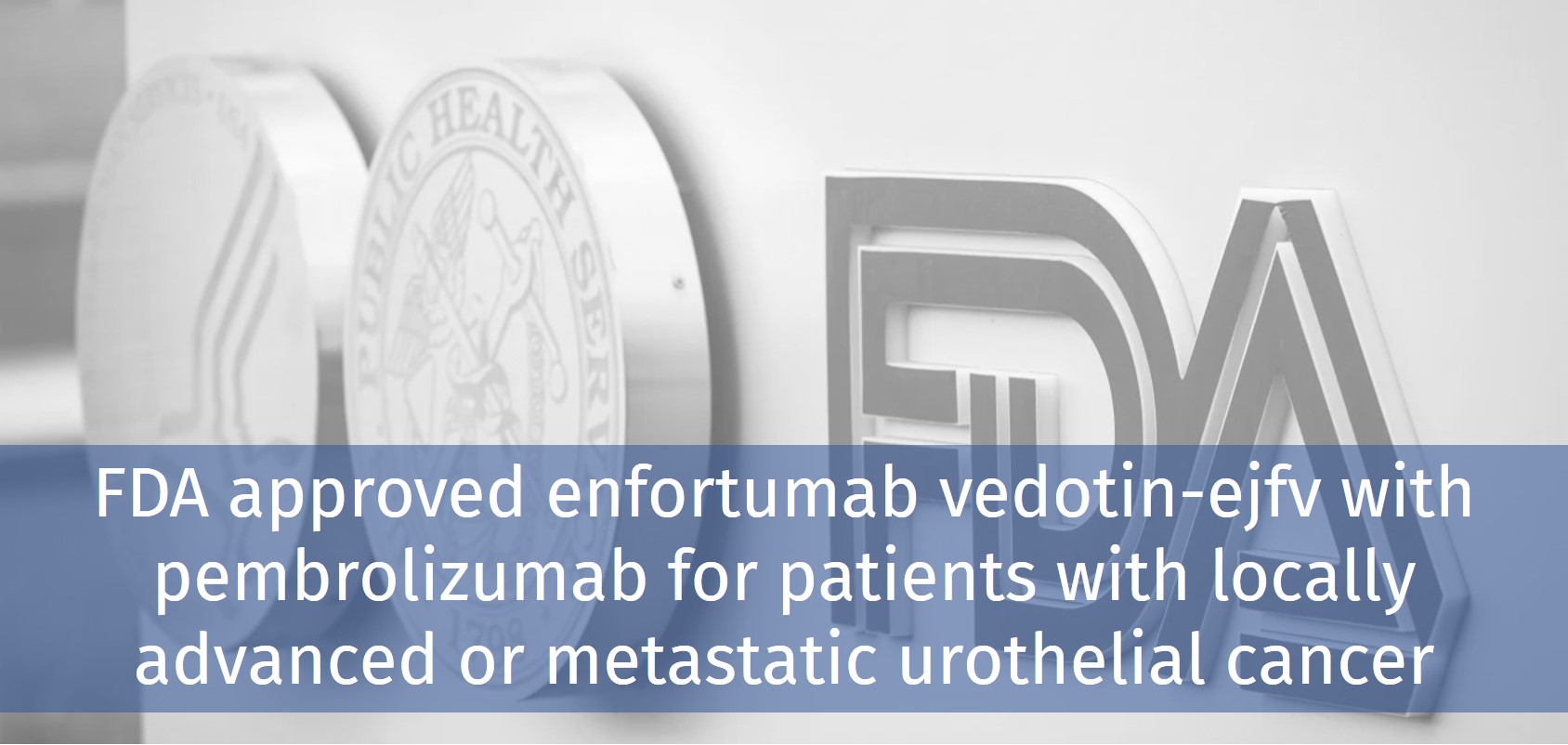FDA Oncology shared on X:
“On December 15, 2023, the Food and Drug Administration (FDA) approved enfortumab vedotin-ejfv (Padcev, Astellas Pharma) in combination with pembrolizumab (Keytruda, Merck) for patients with locally advanced or metastatic urothelial cancer (la/mUC).”
The official announcement from the FDA website below:
“On December 15, 2023, the Food and Drug Administration (FDA) approved enfortumab vedotin-ejfv (Padcev, Astellas Pharma) in combination with pembrolizumab (Keytruda, Merck) for patients with locally advanced or metastatic urothelial cancer (la/mUC). FDA previously granted accelerated approval to this combination for patients with la/mUC who are ineligible for cisplatin-containing chemotherapy.
Efficacy was evaluated in EV-302/KN-A39 (NCT04223856), an open-label, randomized trial of 886 patients with la/mUC and no prior systemic therapy for advanced disease. Patients were randomized 1:1 to receive either enfortumab vedotin-ejfv with pembrolizumab or platinum-based chemotherapy (gemcitabine with either cisplatin or carboplatin). Randomization was stratified by cisplatin eligibility, PD-L1 expression, and presence of liver metastases.
The major efficacy outcome measures were overall survival (OS) and progression-free survival (PFS) as assessed by blinded independent central review.
Statistically significant improvements in both OS and PFS were demonstrated for enfortumab vedotin-ejfv with pembrolizumab compared with platinum-based chemotherapy. Median OS was 31.5 months (95% CI: 25.4, not estimable) for patients who received enfortumab vedotin-ejfv with pembrolizumab and 16.1 months (95% CI: 13.9, 18.3) for those who received platinum-based chemotherapy (Hazard ratio [HR] 0.47 [95% CI: 0.38, 0.58]; p-value<0.0001). Median PFS was 12.5 months (95% CI: 10.4, 16.6) for patients who received enfortumab vedotin-ejfv with pembrolizumab and 6.3 months (95% CI: 6.2, 6.5) for those who received platinum-based chemotherapy (HR 0.45 [95% CI: 0.38, 0.54]; p-value<0.0001).
The most common (≥20%) adverse reactions, including laboratory abnormalities, in patients receiving enfortumab vedotin-ejfv with pembrolizumab were increased aspartate aminotransferase, increased creatinine, rash, increased glucose, peripheral neuropathy, increased lipase, decreased lymphocytes, increased alanine aminotransferase, decreased hemoglobin, fatigue, decreased sodium, decreased phosphate, decreased albumin, pruritus, diarrhea, alopecia, decreased weight, decreased appetite, increased urate, decreased neutrophils, decreased potassium, dry eye, nausea, constipation, increased potassium, dysgeusia, urinary tract infection, and decreased platelets.
The recommended enfortumab vedotin-ejfv dose when given with pembrolizumab is 1.25 mg/kg (up to a maximum of 125 mg for patients ≥ 100 kg) administered as an intravenous infusion over 30 minutes on Days 1 and 8 of a 21-day cycle until disease progression or unacceptable toxicity.
The recommended pembrolizumab dose when given with enfortumab vedotin-ejfv is 200 mg administered as an intravenous infusion every 3 weeks or 400 mg every 6 weeks until disease progression, unacceptable toxicity, or two years of therapy.”
More information is posted here.
Source: FDA Oncology / X
